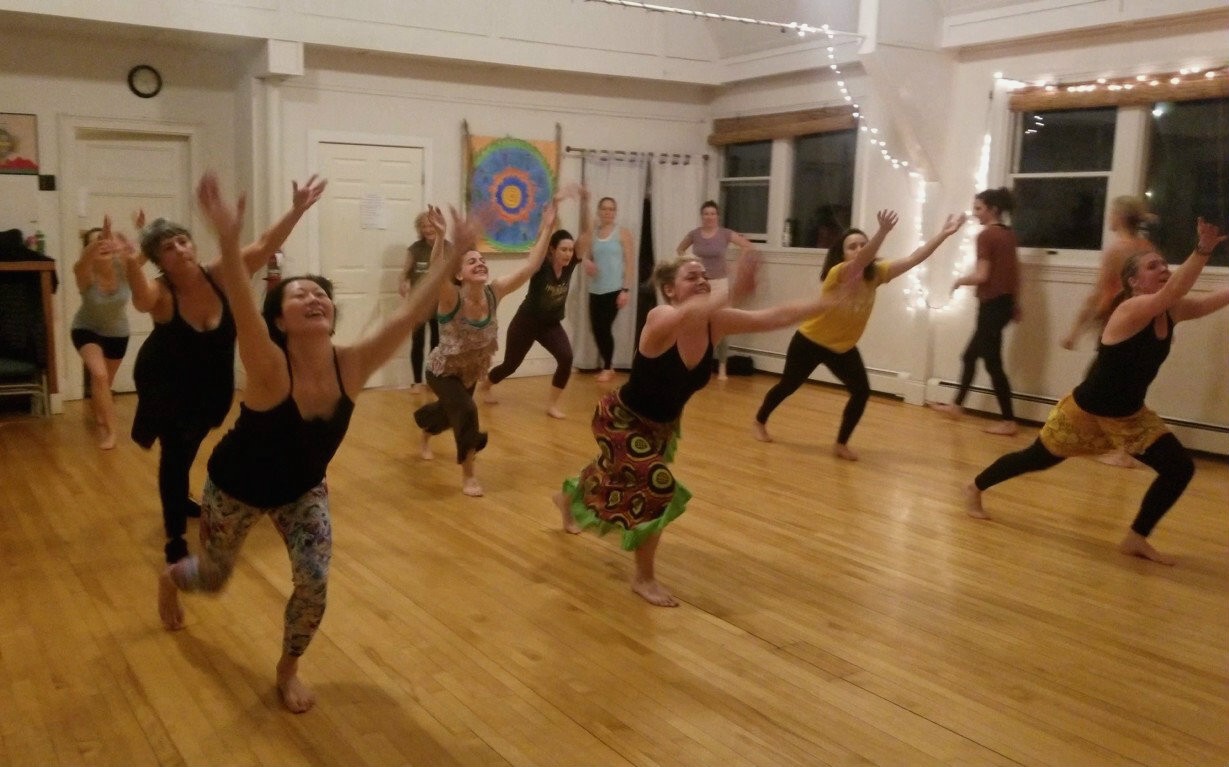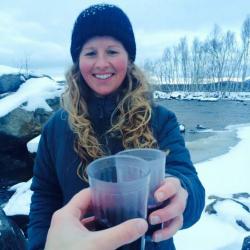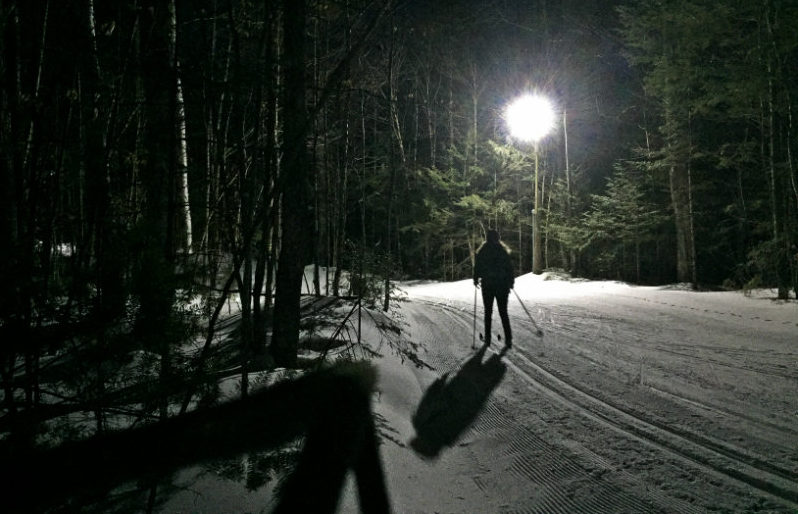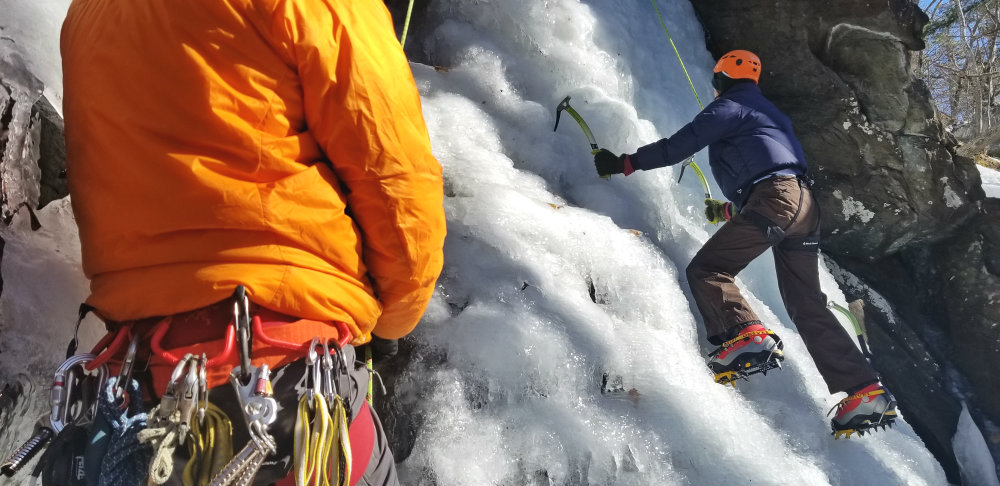Before you even start dancing, your body feels the rhythm.
The sound of fast-paced drumming permeates your skin and reverberates through your bones and fills the room with percussive energy.
You can’t help but start moving.
I felt the drums echoing in my body for hours after, too. But first, there was dancing.

Instructor Marita Kennedy-Castro, founder of Embody the Rhythm, leads Guinea-style West African Dance classes every week inside Portland New Church on Stevens Avenue in Portland. She’s been dancing this form since 1999 and began teaching in 2004, studying under master West African dance and drum artists, both in the U.S. and in Guinea. Marita is also artistic director, choreographer, performer of New Moon Ensemble and co-founder of multi-cultural collaborative Many Waters Arts.
“I am enraptured with the movements, and the way these traditions honor our interconnection to the rhythms of nature and to one another, through celebration of life’s cycles and seasons,” she writes. “Something that is intrinsic to many traditional dance forms, yet so often goes forgotten in American culture.”


The classes are open to dancers of all levels, whether you’ve been exploring West African dance for years or this is your very first time in a dance class of any kind. Marita breaks down the sequences and steps in every class so beginners can learn the basics and more-experienced dancers can continue to hone their steps. And because Marita also seeks to promote awareness and appreciation for the culture and traditions of her teachers, she takes time to talk about the names, meanings, regions and ethnicities from which the dances come.
During a recent Tuesday night class, we learned Sobonikun, a dance from the Malinke people of Guinea in West Africa. Marita told us that Soboninkun is a rhythm and dance traditionally done at baby blessings and wedding celebrations of the Wassoulou Malinke people.

The Tuesday night classes feature live drumming accompaniment from a talented crew of local drummers, including master drummer Namory Keita from Sangbarala, Guinea. (If you’re interested in learning to drum, Namory teaches drum classes, as does Annegret Baier, who you might also recognize from Inanna, Sisters in Rhythm.)
There is also a session that runs on Friday mornings (open to drop-ins) and a pre-school/family session on Saturdays (next 5-week session begins Feb. 9), although the live drumming is only during the Tuesday night class. Read more about the classes.


After kicking off our shoes at the door and pulling off our socks (dancing is generally done barefoot), everyone chit-chatted together before class began. There were a handful of us who were there for the first time, and many others who had been coming for a long time – all of whom raved about how much they enjoyed this class, the movement, the drumming, and the community.
Marita welcomed everyone and shared some of her experience with West African Dance – her passion for it (and for sharing it) is palpable right off the bat. And then the drummers began – a lively and quick-paced rhythm that filled every corner of the room and woke up all the sleepy, it’s-dark-outside cells of our bodies.
We spread out in a wide circle for stretches – Marita leading us with her own movements because it was too loud to hear her – and she slowly transitioned us from toe touches and lunges to rhythmic side-to-sides, our bodies warming up despite the cold outside.
When it was time to learn steps, Marita demonstrated each one, pausing to show a particular twist of the hip or how she planted her foot or rose up off her heel. We all followed along, our arms and legs and chests and hips doing their best to mirror hers. We broke into three lines and, with the drummers drumming away, danced along the floor using these newly learned movements, letting our arms fly wide and our feet bounce.
As an inexperienced dancer who sometimes struggles with choreography, I goofed in spots – stepping to the wrong side or forgetting a turn – but it didn’t matter. We each traveled across the room moving and smiling, letting the sound of the drums guide us forward.
The hour-and-a-half-long class flew by this way – Marita showing us new steps and us dancing across the room in rows, everyone reveling in the sounds and the freedom to take up space and move with energy. And it felt wonderful.

West African Dance and Drum
6-7:30 p.m. Tuesdays
Portland New Church, 302 Stevens Ave., Portland
$16 drop-in ($1 is donated to important initiatives here in Maine and in Guinea. Read more.)
New students pay just $24 for 4 classes
Discounts as needed – nobody turned away for lack of funds.
1st Tuesday Special: To encourage gender diversity on the dance floor, the 1st Tuesday of every month is just $5 for gender-non-conforming and male-identified dancers.
FMI: embodytherhythm.com/dance-class-description/ and www.facebook.com/groups/EmbodyTheRhythm/
– Adult Classes are designed for beginner and intermediate students, bringing community together through the healing power of movement and music. No experience is necessary. Classes are gender neutral ~ same moves danced by all.
– Dancers generally dance barefoot, but dance shoes (not street shoes) are fine too, if preferred.
– Wear comfortable clothing that allows ease of movement, and the ability to work up a sweat.
– Bring a water bottle and stay hydrated.












